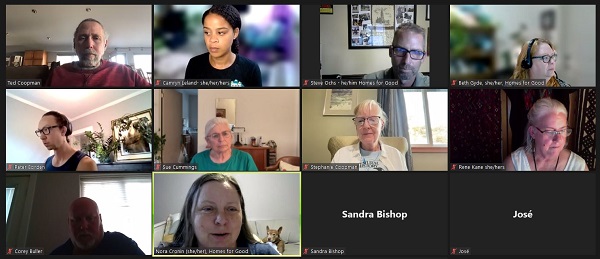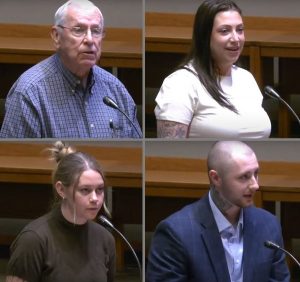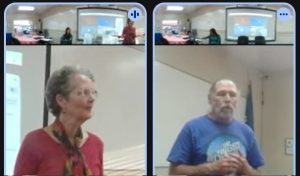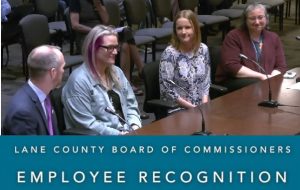Housing agency hears from neighbors on Keystone drug bust
12 min read
At Jefferson Westside’s Aug. 15 board meeting, Homes for Good discusses the recent drug and weapons bust at The Keystone.
Steve Ochs: I’m Steve Ochs with Homes for Good. I don’t want to bore you all by not just jumping right into the incident, but I did want to kind of give you all a little bit of background, how we got here and why the Keystone exists and who it’s serving just as some context to start in.
[00:00:22] So, it’s only 15 units but it’s really the culmination of a lot of planning and desire from the state of Oregon, Lane County, and the city of Eugene to provide more permanent supportive housing in the community, housing geared for those have the biggest barriers to housing, and getting them in housing and then wrapping them with services to help them be successful.
[00:00:45] So that’s when Homes For Good you know, got involved and we started with the Commons on MLK, which is permanent supportive housing across from Autzen Stadium; followed by the Keystone and then the Nell, and the Keystone is the only one of the properties that is geared to families and so, the other properties we currently have are really set for individuals, and the kind of the key to the permanent supportive housing model is it being low barrier. There’s so many barriers to folks that are coming off the street, a variety of issues from mental health, alcohol, past convictions is a big one.
[00:01:21] And so I just want to kind of give that background and context and that’s kind of where the Keystone fits in, it’s the one we have in the community that’s run by Homes For Good that is serving families.
[00:01:33] As far as the screening process goes, we really do the minimum that is allowed. There’s some federal requirements, if you’ve manufactured meth in federal housing before and had arson and things like that, there’s some very basic things, but really, they are very low-barrier, with the key being we’re there when they get there and, you know, and helping them.
[00:01:54] To be frank, when the Keystone opened there, we’ve struggled. And then things have gotten better and now we’ve really had some incidents. And so we were going to definitely talk about the incident that occurred and then also kind of what our steps are moving forward to just to really make sure this type of incident doesn’t happen again.
[00:02:18] I’m sure you’ve all heard, but the incident was that there was, you know, EPD came and did a bust and their Facebook post said almost like a pawn shop was being operated out of the unit that the person was living in.
[00:02:32] And they came in and actually broke in the door. He went out the window and then they seized weapons, drugs, and a bunch of other things.
[00:02:45] And then, you know, following that incident, we did an after-action of what happened. There was nothing in the approval process, there was no error made at any point by property management or rental assistance or anything like that.
[00:02:59] And so, you know, the way we currently have it set up, this person met all of our criteria and was passed on from the county and property management was even in the unit, several times prior to the arrest and it didn’t see anything that was a red flag, as far as weapons laying around or drugs laying out or anything like that.
[00:03:19] The only thing I would also add is that I know that, you know, there’s a lot of neighbors are very concerned about this and frustrated when they don’t see things happening… A lot of times, you know, because of confidentiality, we can’t share things that, like, if somebody gets a lease violation, we’re not able to tell the neighbor that this person was issued a 48-hour notice to fix it, or you’re out of here. You know, so there are things happening behind the scenes, but we can’t share exactly what’s going on. So, I know that can create a level of frustration with if you’re not seeing changes.
[00:03:55] I’ll then pass it to Camryn to talk a little bit more.
[00:03:58] Camryn Leland: Yeah, thank you Steve. So, as Steve mentioned, I’m Camryn Leland. I’m the permanent supportive housing supervisor with Homes for Good. So I help oversee the operations and services management in those programs.
[00:04:12] As of Aug. 1 of this year, we actually decided to take services in-house at the Keystone program. So we are only about 15 days under our operations, but our plan is to provide supportive services directly on site.
[00:04:27] There have been 16 families that have been successfully housed for over 12 months in the community, and we’ve had only about three move out so far, and in PSH (permanent supportive housing), that is extremely successful in terms of stability.
[00:04:43] And we’ve been on site several times and had very in-depth conversations with folks just around the kind of supports and services they need, and I have full confidence that our team will be able to help provide and continue to provide that care for people on site.
[00:04:58] In regards to the specific incident regarding the raid with EPD and the SWAT team, I actually was there on site when this occurred, and I do have to say that it was unfortunately a lack of communication between property management and EPD and services, and we just failed to be able to have the time to arrange something so that we could notify the community, we could work internally in getting people into a safer place so that this could have been handled in a much smoother way.
[00:05:35] Our goal going forward is that EPD and other EMS services in the community would work with us as service providers, so that we can have a much more transparent conversation around the kind of things that are going on in the community and how we can better support residents directly on site.
[00:05:54] I can let Beth take over and start to speak about property management
[00:05:58] Beth Gyde: Thanks, Camryn. I’m Beth Gyde, asset manager at Homes for Good. I don’t have a lot to add. I’ll just touch on a couple of things that that Steve and Camryn mentioned.
[00:06:07] They have secured a more seasoned property manager, one who’s worked in permanent supportive housing before on some of our other sites. There’s also a night host position, then we’ve also contracted for security to patrol the sites over the off hours when there isn’t regular staff on,
[00:06:28] And all those are the results of a big debriefing session that we did have as a collaborative to go over just what happened and how this particular incident just came to be.
[00:06:42] We reviewed all the screening processes, all the criteria. There wasn’t any failure on any of those processes that we have in place that could have caught this. That doesn’t mean there aren’t other protections that we can put in place, but that Quantum had been in the unit to do some minor repairs on a refrigerator light and something else. And then an inspection just as recent as a week before this raid occurred.
[00:07:09] And there wasn’t any indication of anything. This resident was in good standing on their rent, on the unit conditions, all of those things. They just flew under the radar and I, and unfortunately, I don’t know, you know, at this point, there wasn’t anything that that could have stopped that particular thing.
[00:07:30] There’s definitely things that will go in place to keep it from occurring again, as best as we can.
[00:07:36] Ted Coopman, Jefferson Westside chair: Let’s go ahead and open it up for questions for the Homes For Good team. Go ahead. Stephanie.
[00:07:46] Stephanie Coopman: I know you can’t give specifics, but it might be useful to let the neighbors know, and I’m not sure how you would do it, but to let neighbors know kind of generally what you’re doing, like the steps that you took afterwards: We met, we did this, and now we’re doing this. We have a plan.
[00:08:06] These are, like, the sorts of things you’ve told us. I don’t know if you’ve got the money to send a mailer to the more immediate neighbors, or… I don’t know, but some way to get the word out about the steps that you’re taking and to sort of calm people’s fears, because what happens is people start talking and then they talk with each other. They don’t get the information directly from you. And so it gets, it can get really blown out of proportion.
[00:08:36] Sandra Bishop: There was a statistic, I think, given earlier that said 18 people have been helped, which is incredible. I mean, it’s so valuable to have a place where families can be. But what is the duration of people in the units? Have you had enough time to have a sense of duration? Or is there an expectation of time that between turnover…?
[00:09:05] Beth Gyde (asset manager, Homes for Good): We have just two or three years of permanent supportive housing under our belts. To say at what point does a family becomes or an individual becomes stabilized enough to be able to move into more traditional housing? And that would mean that they have secured a job, they’ve got enough income to be able to afford market rents, which is very difficult to do in Eugene, and especially if it’s a one-income family or a one-income household.
[00:09:39] So there isn’t a statistic that tells you how long we have somebody housed, but it is considered permanent housing. They may be there. They may be there for the duration. We have some people in our housing that we built 20 years ago that are still there. And just the, whatever limitations they have, as long as they remain eligible there, there isn’t a time that they have to move out by.
[00:10:06] Ted Coopman, Jefferson Westside chair: The problems around the person who eventually was arrested for the raid, those issues and the kind of activities that were going on in the complex were flagged previously by neighbors. And so I think that as far as the Keystone Advisory Committee list is concerned, that when reports come over from neighbors about what they feel is problematic activity, then those reports are addressed—more than perfunctory addressed.
[00:10:44] Obviously, I would say that I would find it hard to believe that the neighbors did not know what’s going on as far as the other people in the complex, because they’re there all the time, but I don’t know how that works as far as talking with the other people in the complex, because of course, while the neighbors were freaked out and were put in a certain degree of danger by that activity, but people in the complex were very freaked out and put in a lot of danger.
[00:11:13] And one of the concerns that I think we really need to focus on here is that things that are impacting the neighborhood around the Keystone also impact the residents and I mean, these are folks that have done everything they can to make the right choices to try to get out of that situation and get off the street to get away from the craziness And when it follows them in there. That’s not great.
[00:11:39] And I think for us, this has been the persistent problem with that facility is that you don’t have good access control, like you did at the Nell. And so it’s hard keep apprised of what’s going on at that facility, and we realize that, and we’re, I’m heartened by the fact that you are going to be putting more personnel in there,
[00:12:04] But I think that ultimately, especially since you don’t have access control for that property that you’re just going to have to have people there all the time. You know, it’s just that’s just going to be an expense that is just going to go part and parcel with what’s going on for the benefit of the people who are actually living there, especially with the children who are there, but also for the neighborhood that you are embedded in.
[00:12:27] We gave a lot of support for Homes For Good and that facility, and we are feeling a little bit beat up by what’s going on there. And understanding to a certain degree, but really needing to make sure that facility is safe, and that there is no illicit activity going on, and that there is no proximate impacts because anything in the vicinity of that facility that are associated with that facility is your responsibility as well.
[00:12:58] We know why that facility is there we know why those facilities get sited where they get sited: because that’s where land is available. And usually it’s where land is inexpensive, and usually that means poor neighborhoods. And so there needs to be a certain degree of sensitivity about the proximate impacts of a facility like this, and our argument along has been, whether it’s Ollie Court, or whether it’s the Keystone, it’s like, it’s an apartment building. People live in it and as far as we’re concerned, that’s all it is.
[00:13:31] And so we’re going to demand accountability from you as just like we would demand accountability from any, any sort of landlord. And actually more so because of course, you’re, you know, you are a public entity that is running these facilities, and we continue to be very supportive and continue to work.
[00:13:53] We’ve worked very well with Homes For Good and I think that developing that relationship over time has allowed us to have some frank discussions and to make sure that, people are aware, people are educated on both ends of it. And that we both kind of get out of our own individual kind of filter bubbles in terms of looking at the realities of the behaviors on the ground, because we’re really not interested in people’s backstories, you know, it doesn’t matter to the neighbors. It doesn’t matter. You know, it’s what matters is the impacts, you know, what kind of behaviors are going on. Rene?
[00:14:31] Rene Kane: I don’t know how to say this because I know some of you personally from when I was staff at the city, but I’m not hearing you take a lot of responsibility for this situation. And I would love to see that from you to the nearby neighbors and new to the neighborhood.
[00:14:51] But I’m just hearing like, ‘Oh, you know, our processes. Oh, this or that.’ And it’s like, you know, ultimately you are responsible for how this community that you have created in our neighborhood works in the larger community. And I just hope you kind of think about that.
[00:15:19] John Q: The board heard the latest about Ollie Court from Nora Cronin.
[00:15:22] Nora Cronin: I’m Nora Cronin. I’m a project development manager at Homes For Good. We received an award of funding at the state level for the project. So the project is a go. To refresh your memory, the Ollie Court is 81 units of one-, two-, and three-bedroom apartments in two buildings and in one of the buildings, there will be a ground floor Early Learning Center of six classrooms.
[00:15:45] And so we were very excited to get kind of a line item and from the legislature to get us $4.9 million for the Early Learning Center. That was a risk for us and very excited to have that allocation. So we know how we’re paying for that commercial portion. So we are full steam ahead with the architects. Our intention is to be ready to submit for building permits in early February and then planning on closing on our financing and starting construction end of June, early July of next year.
[00:16:17] We would be happy to come back and share the updated design with you all whenever you would have us at a general meeting.
[00:16:24] John Q: Homes for Good discusses the drug and weapons bust at the Keystone and shares the latest schedule for 81-unit Ollie Court.



